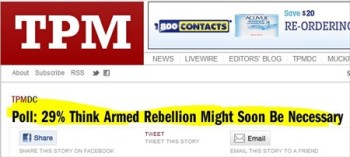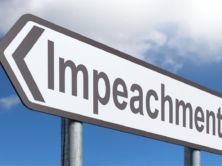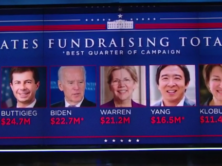
Do 29% really support an "armed revolution?" (Credit: Talking Points Memo, screenshot, highlight added)
Recently, Fairleigh Dickinson’s PublicMind poll released results of a national survey showing 29% of registered voters agree with the statement, “In the next few years, an armed revolution might be necessary in order to protect our liberties.”
This got TalkingPointsMemo all in a tizzy, referring to the numbers as “staggering” and warning its readers that these “eye-opening findings serve as a reminder that Americans’ deeply held beliefs about gun rights have a tendency to cross over into outright conspiracy theories about a nefarious government seeking to trample their constitutional rights — paranoia that pro-gun groups like the National Rifle Association have at times helped stoke.”
But beware this interpretation!
There are two problems with the way the question is worded, and thus with the interpretations of the results offered by Fairleigh Dickinson and TPM.
Question Is Subject To Many Different Interpretations
The first problem is that the question itself is vague in several respects. There is mention of an “armed revolution,” but it’s not clear who would be revolting against whom. The question also states that it “might” be necessary for such a revolution, which is so hypothetical we have no idea what a respondent might mean when he or she agrees to it. And the question refers to protecting “our liberties,” but doesn’t mention specifically what those “liberties” might be.
In 1995, when I was Managing Editor of the Gallup Poll, Gallup asked a national sample of adults this question: “In your opinion, is the Federal Government in Washington an immediate threat to the rights and freedoms of ordinary citizens like yourself, or not?” About a third said yes.
At the time it seemed “staggering” that so many people believed the government was an “immediate” threat to their rights and freedoms. So, in a subsequent poll in August, 1995, we reiterated the question, giving us these results: Yes, 33%; No, 65%; No opinion, 2%.
A follow-up question was asked of respondents who said “yes”: “Please tell me in your own words WHY you think the Federal government in Washington is an immediate threat to the rights and freedoms of ordinary citizens like yourself?”
The responses were all over the map, some which could be considered on the liberal side of the partisan spectrum, others on the conservative. We thought we were asking people about their concerns over basic rights and freedoms guaranteed in the Constitution. But the vast majority of responses fell into two general categories: Either they were about policy preferences, how the government was not pursuing policies the respondent desired; or they were so vague, they expressed a general disgruntlement with government, but nothing that could be clearly related to specific rights and freedoms.
The verbatim responses included opposition to: Too much government power (in principle), cutting Social Security or Medicare, paying income taxes (or taxes in general), cutting back on government aid, having lobbyists in Washington, passing seatbelt and helmet laws, taking away funding for college, corruption, taking away guns, a congressman voting against respondent’s interests, helping the poor people too much, not helping the poor people enough.
The vagueness of the Fairleigh Dickinson question (as well as its tentative qualification that an armed revolution “might” be necessary) is subject to the same wildly diverse interpretations by respondents as the Gallup question.
Did respondents who agreed with the Fairleigh Dickinson statement, for example, have the same interpretation as TPM, that they believe there is “a nefarious government seeking to trample their constitutional rights”? That’s not what the question asked. If Fairleigh Dickinson wanted to find out if people felt that way about the Federal Government, the poll should have been more explicit in asking about that view.
So, the poll results suggest that a certain number of people have reservations about conditions in American life that “might” (or might not) require “armed revolution,” but we don’t have any real idea of what that means to the respondents who agreed to the statement.
Agree/Disagree Question Subject to “Response Acquiescence”
A second reason why the Fairleigh Dickinson question is problematic is that it is framed with an agree/disagree format. Pollsters know that such a format is subject to “response acquiescence.”
That means that the very positive phrasing of the question itself will induce some people to agree with it just because it’s stated in that positive manner. Such respondents “acquiesce” to the statement, because they haven’t given the issue much thought and tend to be positive anyway, so why not just “agree”? That’s why, in general, agree/disagree statements should be avoided.
The Gallup question avoided that format (though, as I’ve suggested, it suffered from being too imprecise to give much useful information), by asking whether the government was a threat, “or not?” Polling 101 classes on question wording will emphasize the need to avoid agree/disagree questions, and instead to provide a balance, such as: “In the next few years, in order to protect our liberties, do you think an armed revolution will be necessary, or do you think it won’t be necessary?”
This revised version still leaves open much ambiguity as to what respondents mean if they say armed revolution will be necessary, but at least the format reduces the chances of distortion due to response acquiescence.
If you are worried the poll results mean that three in ten voters are ready to arm themselves and revolt against the government, relax! People like to complain. And polls are a good way to do it without having to take action. Just don’t take them literally.






Comments Terms and Conditions